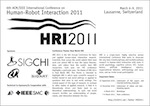Authors
Important Dates
- 24 September 2010: Submission of full papers and tutorial/workshop proposals
- 12-16 November 2010: Rebuttal Period
- 15 December 2010: Notification of full paper acceptance
- 22 December 2010: Submission of late breaking reports and videos
- 4 January 2011: Notification of late breaking reports and videos
- 6 January 2011: Final camera-ready full papers due
- 10 January 2011: Final camera-ready late breaking reports and videos due
Submission Information
Full Papers
HRI2011 welcomes original, high-quality contributions that advance the state of the art in technical and social challenges of human-robot interaction. HRI is a single-track conference. Each accepted full paper will be presented in an oral session, and will be published in the conference proceedings, and archived in the IEEE XPlore and ACM Digital Library.
Submission due for full papers is Friday, September 24, 2010 by 11:59:59 PDT. Submit your paper through the https://precisionconference.com/~hri website. All authors will be invited and are strongly encouraged to participate in the review process.
Formatting All papers for the conference must be submitted in PDF format and conform to ACM SIG Proceedings specifications.
- Templates for Word, Word Perfect, and LaTeX2e can be found here.
- All submissions must use only “Type 1″ (scalable) fonts (not bitmapped fonts). This is a requirement for proceedings to appear in the ACM digital library.
- Page limit is 8 pages (including figures and references).
- All papers for the conference must be submitted in PDF format.
- Submission is not anonymous. Authors’ name etc. are not required to be hidden.
Please be aware that the proceedings will be printed in black and white (grayscale). Thus, if your paper contains color, we suggest that you verify that the figures or images reproduce well when printed in black and white.
Submitting Submit your paper through the https://www.precisionconference.com/~hri website. All authors will be invited and are strongly encouraged to participate in the review process.
Review criteria All papers must make an original and substantive contribution to the field of human-robot interaction (HRI). Authors should clearly articulate the paper’s contribution to the field.
- Originality. All papers must present original work. Authors should clearly articulate how the contribution relates to other work in HRI as well as the fields of study on which the paper draws. Submissions should not have been previously published or be under simultaneous review for any other conference or journal. Please consult with program co-chairs enough in advance of the submission deadline if you are not sure whether a previously published paper unduly and inappropriately overlaps with your current submission.
- Novelty. The HRI conference is the place for innovative ideas. We welcome ‘big idea’ and provocative papers, even if they may not be perfectly implemented. We also welcome papers that bring together subfields.
- Relevance. We invite broad participation. We welcome research with roots in robotics, psychology, artificial intelligence, cognitive science, HCI, human factors, organizational behavior, simulation, design, anthropology, and many other fields. As noted earlier, however, all papers must be relevant to the field of HRI. For example, a paper that describes a new face tracking algorithm or involves an elderly population needs to establish how the results directly contribute to HRI.
- Soundness. A paper needs to be technologically/methodologically sound based on the criteria generally used for that technology/method within a given field.
- For technical papers, please provide adequate details to understand what was developed. Moreover, please provide evaluations commonly used in a given field as well as a path to “feasibility” for a given scenario of human-robot interaction. For example, a paper contributing a face recognition technology would likely use standard recognition metrics (e.g., ROC curve). In addition, the paper would likely include an evaluation of interactive performance in a given scenario.
- For empirical papers, please provide adequate detail to understand what was done, how the data were collected, from how many people, the characteristics of these people, what type of robot was involved (if a robot was used), if a wizard of oz technique was used, which part was controlled by a wizard, etc. Authors should take care to use correct terminology for their methods to avoid being evaluated against the incorrect set of criteria. For example, a user study of 5 people should be referred to as a user study and not an experiment. For papers with experiments, standards used in psychology for conducting and reporting experiments should be used. In addition, the paper would likely articulate its contribution either to design implications for a robot in the future or to basic science related to human-robot interaction.
- Methodological flexibility. We recognize that different methods provide different ways of generating important knowledge in HRI. Thus we want to emphasize that we will treat all methods as valid a priori and evaluate each of them based on the contribution that they make to HRI.
- Accessibility. All papers must be written to be accessible for a broad, interdisciplinary/multidisciplinary HRI audience.
Policy for a conflict of interest in the review process A “conflict of interest” is defined as follows:
- Ph.D. thesis advisor or advisee
- Postdoctoral advisor or advisee
- Collaborators or co-authors for the past 48 months
- Any other individual or institution with which the investigator has financial ties
Reviewers
A reviewer who has a conflict of interest for one of the co-authors of a paper will not review that paper. Please decline the review request if you have a conflict of interest for the assigned paper. The PC member in charge will find an alternative reviewer.
Program Committee (PC) members
A PC member who has a conflict of interest for a paper will not handle that paper in either a primary or secondary role, and will not participate in the decision process of the paper.
Program co-chairs
A program co-chair who has a conflict of interest for a paper will not participate in the review process for the paper. In the case where both program co-chairs have a conflict of interest, one of the persons below, who does not have a conflict of interest, in the following order, will lead the review process. She/he will take the role of “assigning the primary and secondary PC member”, and lead the discussion of the paper at the PC meeting to decide acceptance/rejection of the paper.
- One of the general chairs
- One of next year’s program co-chairs
Tutorials and Workshops
We would like to invite you to organize a Workshop or Tutorial at HRI2011. Tutorials and workshops will be held on March 6, one day before the main technical sessions. Participants in tutorials and workshops are required to register for the main conference as well.
Submission instructions for organizers follow below. All tutorial/workshop proposals must be submitted by September 22th 2010. The proposals submitted will be subjected to a review process.
Tutorials We invite experts in different areas to propose half-day or full-day tutorials relevant to the HRI2011 theme. Examples of topics are state-of-the-art overviews of particular HRI areas or design/research methods. Interdisciplinary approaches are particularly welcome. Please submit the following information (up to 2 pages) to the tutorial/workshop chairs, Adriana Tapus and Kerstin Dautenhahn, no later than September 22th 2010:
- Title of tutorial
- Tutorial speaker(s), including short CV’s
- Motivation or background
- Target audience or prerequisites
- Overview of tutorial including topics covered
- Links and references relevant to the tutorial
If the tutorial is accepted, the submitted material will be used for advertising it as part of HRI2011.
Workshops Workshops are an opportunity for participants to meet other members of the HRI community, to discuss problems, and to present their ideas around a common topic. The workshops can be half-day or full-day, and could cover any topic relevant to HRI research, development, or education. Interdisciplinary and user-centered approaches are particularly welcome. The format of the workshop may vary depending on the topic and audience.
The responsibilities of workshop organizers include:
- Setting up a website for the workshop that will be linked to the HRI2011 website;
- Publicizing the workshop and soliciting position papers among potential participants. A position paper outlines the submitter’s view on the workshop theme and the reasons for the submitter’s interest in the topic. The workshop organizers will select workshop participants based on the quality of submitted contributions;
- (When applicable) putting together proceedings of the workshop consisting of accepted contributions and other relevant materials.
Please send your workshop proposal in the following form to Adriana Tapus and Kerstin Dautenhahn no later than September 22th 2010:
- Title of workshop
- Organizer(s), including contact information and short CV’s
- Abstract of about 250 words with suggested length and format of the workshop
- Prerequisites for participation
- Required format of workshop contributions
- Plan for documentation of the workshop
- List of potential attendees
Late-breaking reports (LBR)
Our paper submission website will be open for Late-Breaking Reports (2 pages, following the same guidelines as the full papers – Templates for Word, Word Perfect, and LaTeX2e can be found here) until December 22, 2010, 11:59 pm PST. The LBR session is a venue for early stage research results, as compared to the full-paper track of the conference. Accepted abstracts will be presented at a poster session during HRI 2011.
Late-Breaking Reports will be available to attendees and the research community via the conference DVD, the ACM Digital Library, and IEEE Xplore. However, authors will have the option of opting out from including their reports in these archives, which will enable them to publish their completed work in other venues, while still allowing this early version to remain visible to HRI researchers worldwide. Information on the opt-out option will be provided along with the acceptance notice for the reports.
Authors will be notified of the acceptance decision by January 4, 2011. For questions, please contact LBR chairs Cindy Bethel and Miguel Salichs.
Important: Due to publishing deadlines, the originally submitted document will be taken as the camera-ready version for Late-Breaking Reports.
Videos
We invite videos related to all aspects of HRI. This is a peer-reviewed session. In addition to being judged based on the importance of the lessons learned and the novelty of the situation, videos will also be judged with respect to their entertainment value. The videos will be published in the conference proceedings and archived in the ACM Digital Library.
Guidelines and Requirements
- Videos should be self explanatory. There will be no live narration or introduction.
- As this is peer-reviewed and archival, the chairs strongly discourage videos which contain advertisements or are heavily promotional in nature.
- No revisions will be accepted. Submit the final version.
- Videos should not exceed 3 minutes in length. We recommend titles and credits last less than 3 seconds each.
- The video cannot exceed 30MB (upload capped).
- The video should play on standard PC and Macintosh computers with no 3rd party codecs added. Use Windows .avi, QuickTime.mov, or .mp4.
- Do not use DRM.
- Start the filename with the lead author’s last name.
- The videos will be played on a projected screen. Therefore, please use a horizontal resolution of at least 640 pixels. If you can use a higher resolution and still stay under the MB cap, please do so.
- If accepted, ACM requires video authors to sign a release. Copyright remains with author but 3rd party material must have verified copyright. Therefore, copyrighted media (music, video, etc) should not be included unless permission has been obtained. Authors are responsible for obtaining such permission.
Submission instructions
Please submit your video abstract and movie through the https://precisionconference.com/~hri website. The submission deadline is December 22, 2010.


